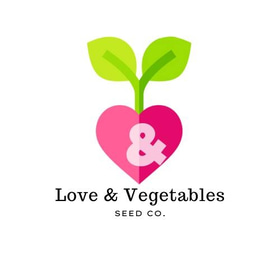60 Heirloom Seed Varieties – Only $50! 🌱 Free Shipping
🌱 Frequently Asked Questions (FAQ)
Welcome to Love & Vegetables — where seeds, soil, and soul meet. Whether you're a curious beginner or a seasoned green thumb, we've gathered answers to the most common questions about our seeds, bundles, shipping, and growing your own food.
🌿 General Questions
What is Love & Vegetables?
Love & Vegetables is a one-man garden movement turned seed company. We sell heirloom, organic, non-GMO seeds and make gardening accessible for everyone. Our mission is to support food independence, backyard abundance, and joyful living — one seed at a time.
Are your seeds organic and non-GMO?
Yes! All seeds sold by Love & Vegetables are heirloom, non-GMO, and grown without synthetic chemicals. Many are USDA Organic certified or sourced from small U.S. farms using organic practices.
Where are Love & Vegetables seeds grown?
Our seeds are grown and packaged in the USA, including some right here in Pennsylvania. We also source from trusted partners who align with our values.
How many seeds come in each packet?
Each seed pack contains between 100–300+ seeds, depending on the variety. We list average seed count or weight for every product. Most packs are generous enough to plant a full garden bed or share with friends.
🌱 Gardening & Growing
I’m new to gardening — where should I start?
Start with our beginner-friendly Garden Starter Bundles or themed kits like “The Pizza Patch” or “Culinary Herbs Collection.” You’ll get easy-to-grow seeds with tips and activity ideas — great for kids and adults alike.
Do you offer kid-friendly or educational seed kits?
Yes! Our Culinary Kids Series and Garden Avengers Collection are fun, collectible seed kits that teach children how to grow their own food through characters, stat cards, and story-based packaging. They're as entertaining as they are educational.
How long do seeds last?
Properly stored seeds can last 2–5 years or more. Keep them in a cool, dry place in their resealable, Mylar-lined packaging, and most varieties will remain viable for multiple seasons.
Do you include planting instructions?
Yes. Each seed packet includes basic planting tips, and we’re adding QR codes that link to digital grow guides. We also share growing tips and blog posts regularly on loveandvegetables.com/blog.
📦 Orders, Shipping & Returns
Where do you ship?
We currently ship across the U.S. and offer free shipping on all domestic orders. For wholesale or international inquiries, contact us directly.
How long does it take to receive my order?
Orders are typically processed and shipped within 2–3 business days. Most customers receive their seeds within 5–7 days. During peak season (February–April), please allow a bit more time.
Do you offer refunds or exchanges?
We want you to love your seeds! If you experience any issues, email us at support@loveandvegetables.com and we’ll make it right. Please reach out within 30 days of your order.
Can I track my shipment?
Yes! All orders come with a tracking number once shipped. You’ll receive an email confirmation with the details.
🌍 About the Brand
Who runs Love & Vegetables?
Love & Vegetables is founded by Keith Kalmanowicz, a chef-turned-gardener who believes that everyone should have access to real food, real seeds, and a real connection to the earth. What started as a pop-up café turned into a personal mission to spread gardening, community, and love.
Why should I buy from Love & Vegetables instead of a big box store?
Because you're not just buying seeds — you're joining a movement. We package every order with intention, offer better value, and give you hand-curated heirloom seeds that are often fresher and more unique than what you'll find on store shelves.
Do you offer wholesale or custom seed packs for events?
Yes! We offer custom printed seed packs for weddings, corporate events, schools, and community programs. Reach out via our contact form for a custom quote.
Are heirloom seeds better for the environment?
Yes. Heirloom seeds promote biodiversity, can be saved and replanted, and are typically open-pollinated, which supports pollinator populations and long-term sustainability.
Can gardening reduce my carbon footprint?
Absolutely. Growing food at home reduces the need for fossil fuel-heavy transport, packaging waste, and supports local ecosystems. Every backyard tomato helps.
What are the best vegetables to grow for beginners?
Some of our favorite easy-grow veggies include radishes, bush beans, lettuce, zucchini, and cherry tomatoes — all available in our starter packs.
Seeds
Quality organic non-GMO vegetable seeds for sale.
Shop
Grow
seed@loveandvegetales.com
+1 (570) 212-9613
© 2025. All things considered.
